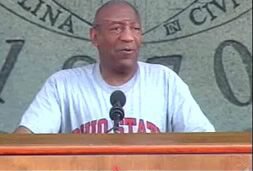Cosby Tells Students, "Look at What You're Accepting"
"Bill Cosby's here, I can't miss this, it's a once in lifetime event," said Cristina Payne, a senior radio-television-film major at Howard University. "I knew whatever he had to say would be important and comical." As students slowly filled Cramton Auditorium just before spring break, they read the screen on stage. It said, "Back in the Day: Repaying Your Debt." Debbie Allen, Howard alumna and member of the Board of Trustees, took to the stage with her sister, actress Phylicia Rashad. "I hope your hearts and minds are open so you can receive everything," Rashad said. Donning a Howard University hat and sweatshirt, Cosby -- actor, comic, philanthropist -- began to captivate his listeners. "Wake up and smell what college is suppose to be about," Cosby demanded. "Think about how you worked hard and earned your way to be here." "Our surrogate father spoke to us as if we were right in the Huxtable living room. So we listened," Payne said. It wasn't just a lecture; Cosby was also bestowing knowledge. As he talked, he flipped through slides of lynched black people and the white people below them smiling and posing for the camera. Said Cosby, "If you knew how you got here from back in the day, you wouldn't . . . accept such degradations as black men calling black women b****es and h**s, black people addressing each other as 'nigga' and the creation and usage of Ebonics when we have yet to master English language." "I just put the feeling in you," said Cosby at the March 12 event. "It's not about those evil forces, but what we can do to them." For some students, these pictures sparked something deeper than anger. "Anger is a phase, a temporary emotion," said Olu Burrell, a master's candidate in English. "We fail to turn those phases into a focus." Burrell said that if we looked at those pictures and situations and succumbed to anger, we would be focusing on being the victim. As Cosby moved from still pictures to movies, the tension built as clips played from the open-casket funeral of lynching victim Emmett Till, and from the trial of the suspects, which ended with a verdict of not guilty. Cosby warned, "Don't be angry at those white people. Look at what you're accepting. It's not what he's doing to you, it's what you're not doing." He continued with clips from the television documentary "Eyes on the Prize" to show the sacrifices our ancestors made. "Back in the day, they [black people] weren't thinking about themselves. They didn't even know us, but they were thinking about the future." "We're taking advantage of the position we're in. Our ancestors struggled to put us where we are and we're being lackadaisical in our attitude," Burrell said. Payne, who is one of the students leading a movement to boycott BET programming, sees a strong connection between Cosby's presentation and the "Cut Uncut" campaign, a movement on Howard's campus against programming that she feels is degrading to African Americans, particularly the late-night BET video show "Uncut." "The 'Back in the Day' revival session was so on point and on time," Payne said. "It was right in line with the BET protest, Tavis Smiley's 'State of the Black Family', Georgetown and Columbia University's racist gestures . . ." "'Cut Uncut' is about getting people to think outside of the box, outside of 'Uncut,' outside of BET and outside of these four [Howard University] blocks; and to consider not just right here and now, in this second, but the future, our future and our children's future. "We need to see ourselves through the eyes of those who are looking in at us as a whole. 'These are strange times we are living in,' this is what the older generation is saying and what we permit in this generation will only get worse in the next." Cosby said that it is up to this generation of students, which must turn out, study and become. "The tab has been paid for, all you have to do is pick it up," Cosby said. "Procrastination is the devil's cousin." Posted April 5, 2004 |
https://blackcollegewire.org/culture/040405_cosby-cramton/
|
Home | News | Sports | Culture | Voices | Images | Projects | About Us Copyright © 2006 Black College Wire. Black College Wire is a project of the Black College Communication Association and has partnerships with The National Association of Black Journalists and the Robert C. Maynard Institute for Journalism Education. |
